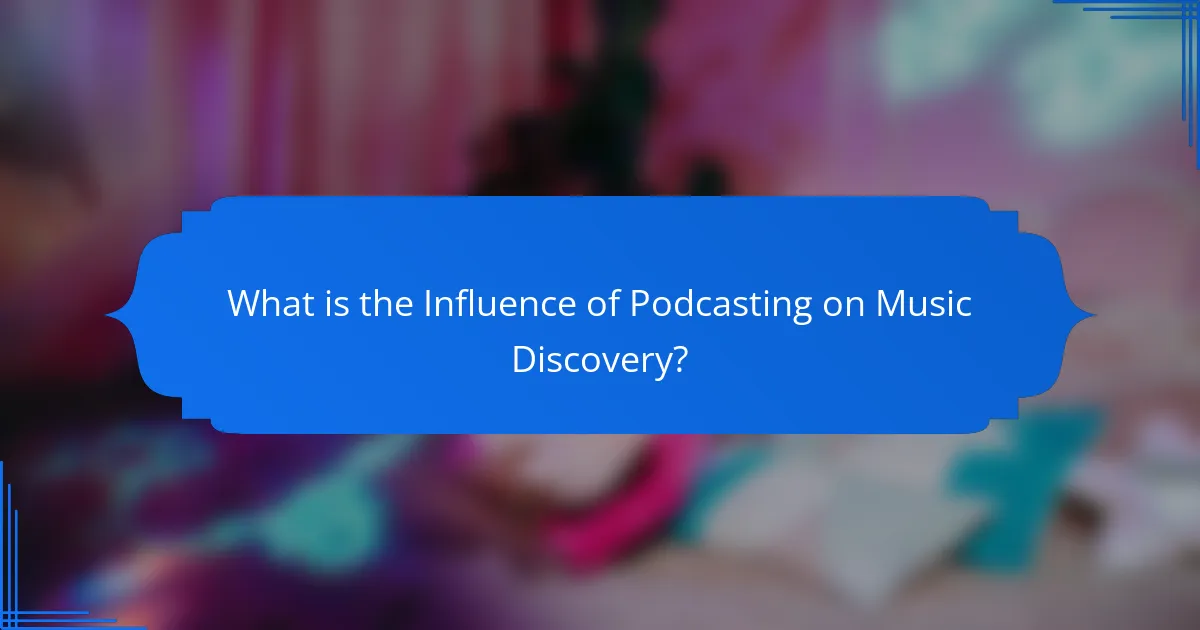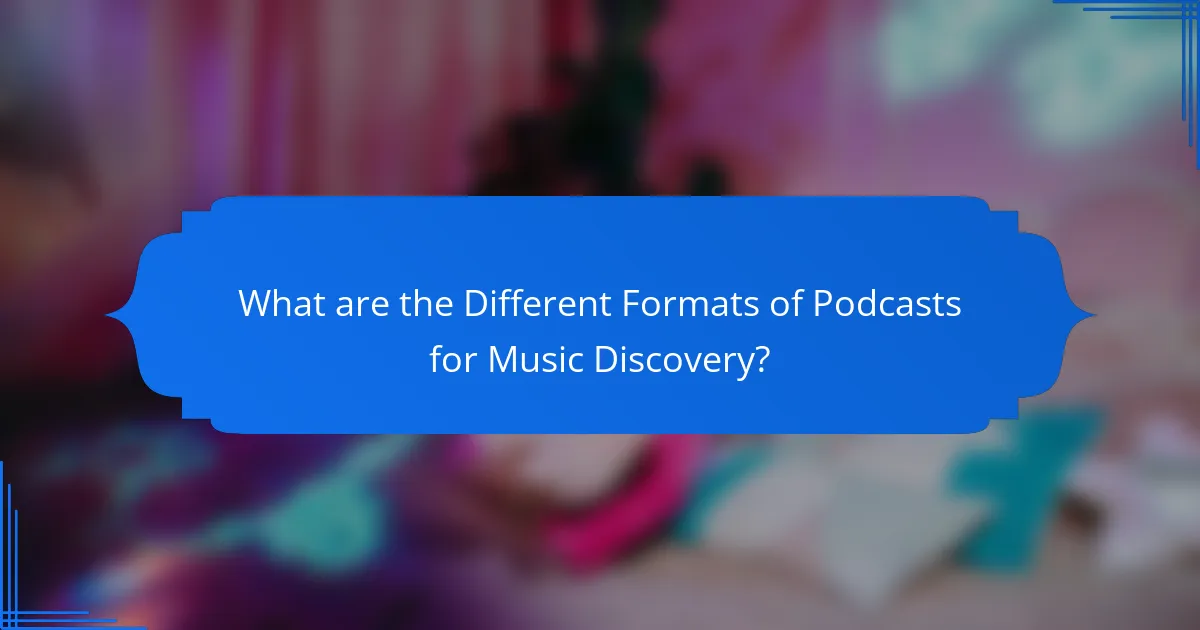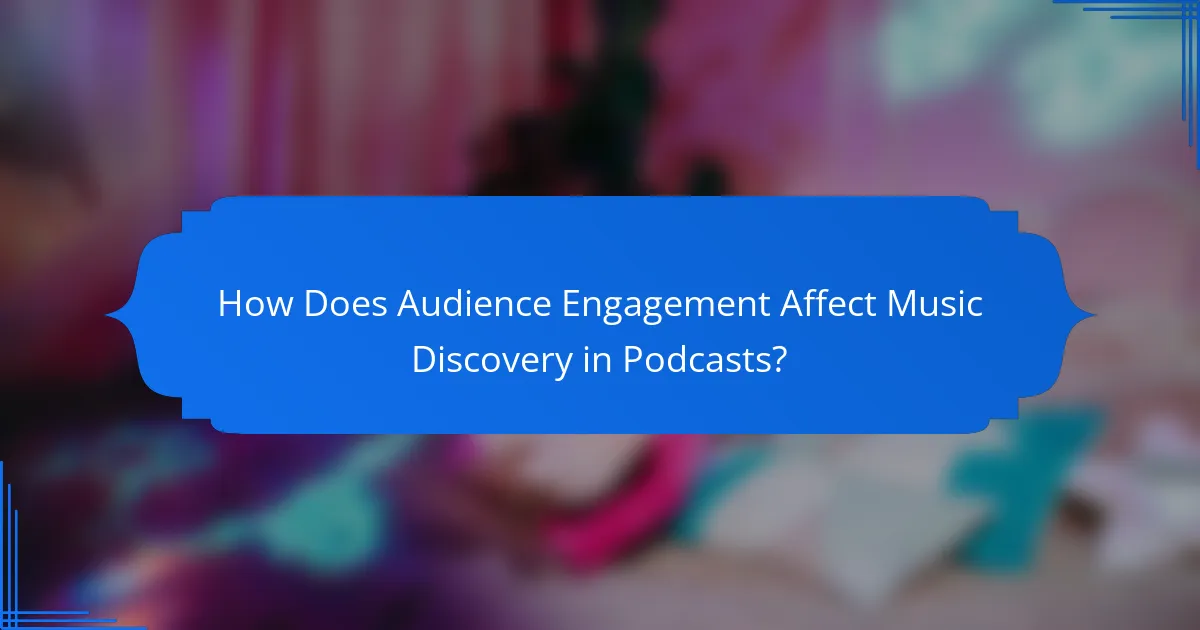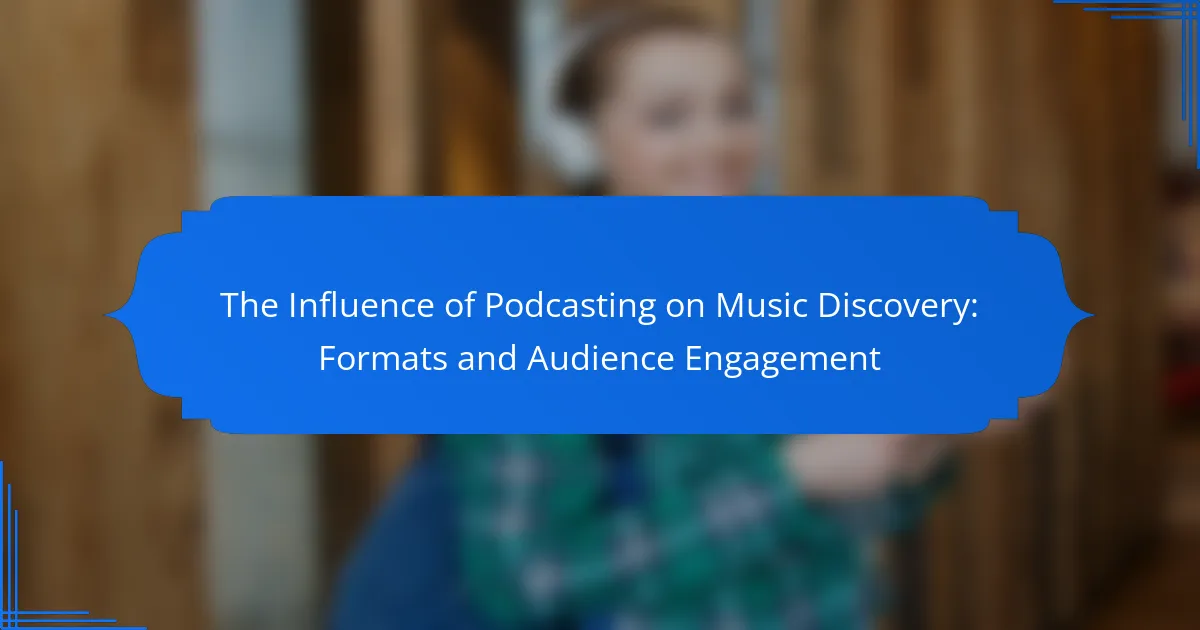Podcasting significantly influences music discovery by introducing listeners to new artists and genres through various formats, including interview-based shows, curated playlists, and narrative storytelling. These formats enhance audience engagement, fostering a community that encourages exploration of unfamiliar music styles. Research indicates that a substantial percentage of podcast listeners discover new music via podcasts, with engagement leading to increased interest in artists’ works. Additionally, platforms like Spotify integrate podcasts with music, further facilitating the discovery process. The article explores the role of podcasting in music discovery, highlighting the impact of different podcast formats and the importance of audience interaction.

What is the Influence of Podcasting on Music Discovery?
Podcasting significantly influences music discovery by introducing listeners to new artists and genres. Podcasts often feature music recommendations, interviews with musicians, and curated playlists. This format allows for deeper storytelling and context around the music. According to a 2021 study by Edison Research, 41% of podcast listeners discovered new music through podcasts. The conversational nature of podcasts fosters a personal connection between hosts and listeners. This engagement encourages exploration of unfamiliar music styles. Additionally, platforms like Spotify integrate podcasts with music, further enhancing discovery. The influence of podcasting on music discovery is evident in the growing trend of music-related content in the podcasting space.
How has podcasting changed the landscape of music discovery?
Podcasting has transformed music discovery by providing curated content and personal recommendations. It allows artists to connect directly with listeners through discussions and interviews. This format creates a more intimate and engaging experience. Listeners often discover new music through recommendations in podcast episodes. According to a 2021 survey by Edison Research, 61% of podcast listeners reported discovering new music through podcasts. This shift has diminished traditional radio’s role in music discovery. Podcasts also enable niche genres to gain visibility. Overall, podcasting enhances music discovery through personalized and diverse content.
What role do podcasts play in promoting new music?
Podcasts play a significant role in promoting new music by providing a platform for artists to share their work. They often feature interviews with musicians, allowing for deeper connections with audiences. Additionally, music podcasts curate playlists that introduce listeners to emerging artists. This exposure is crucial for new musicians seeking to build their fan base. According to a 2021 study by Edison Research, 41% of podcast listeners discovered new music through podcasts. This statistic highlights the effectiveness of podcasts in music promotion. Furthermore, podcasts can create buzz around upcoming releases, enhancing visibility in a crowded market. Overall, podcasts serve as a vital tool for music discovery and artist promotion.
How do podcast formats affect music discovery?
Podcast formats significantly influence music discovery by shaping how listeners engage with content. Narrative-driven podcasts often provide context and stories behind songs, enhancing emotional connections. Interview formats allow artists to share insights, creating a personal bond with audiences. Curated playlists within podcasts introduce listeners to new music, broadening their exposure. Additionally, episodic formats encourage regular listening, fostering ongoing discovery. Research shows that 54% of podcast listeners have discovered new music through podcasts, highlighting their role in music exploration.
Why is audience engagement important in music discovery through podcasts?
Audience engagement is crucial in music discovery through podcasts because it enhances listener connection and retention. Engaged audiences are more likely to seek out featured artists and songs. This interaction can lead to increased streaming and purchasing of music. According to a 2021 report by Edison Research, 70% of podcast listeners discover new music through podcasts. Active engagement, such as listener feedback and discussions, fosters community and shared experiences. This communal aspect encourages listeners to explore new genres and artists. Overall, audience engagement drives the effectiveness of podcasts as a tool for music discovery.
What methods do podcasts use to engage their audience?
Podcasts use various methods to engage their audience. Interactive elements like listener polls and Q&A sessions foster participation. Storytelling techniques create emotional connections, enhancing listener retention. Consistent episode releases build audience anticipation and loyalty. High-quality audio production improves the overall listening experience. Guest interviews introduce diverse perspectives, attracting wider audiences. Social media promotion encourages community interaction and feedback. Personalized content, such as tailored recommendations, resonates with individual preferences. These strategies collectively enhance audience engagement and satisfaction in the podcasting landscape.
How does audience feedback shape music recommendations?
Audience feedback shapes music recommendations by providing insights into listener preferences. Streaming platforms analyze user interactions such as likes, skips, and shares. This data helps algorithms identify popular genres and artists. For example, Spotify uses user playlists to refine its recommendation system. Audience feedback also influences curated playlists. Curators consider listener engagement metrics to select featured tracks. Additionally, social media reactions can drive trends in music popularity. Research shows that user-generated content significantly impacts music discovery. This feedback loop creates a more personalized listening experience.

What are the Different Formats of Podcasts for Music Discovery?
The different formats of podcasts for music discovery include interview-based shows, curated playlists, and narrative storytelling. Interview-based shows feature conversations with artists, producers, or music experts. These discussions often reveal insights about the music and the creative process. Curated playlists present a selection of songs around a specific theme or genre. These playlists help listeners discover new tracks and artists. Narrative storytelling formats weave music into a larger narrative, often exploring cultural or historical contexts. This format engages listeners by connecting music to stories. Each format serves to enhance music discovery in unique ways.
What types of podcast formats are most effective for music discovery?
Interview-based podcasts are the most effective format for music discovery. They feature artists discussing their music and creative processes. This format allows listeners to connect personally with musicians. Additionally, curated playlists within podcasts introduce new tracks to audiences. Narrative storytelling podcasts can also engage listeners by weaving music into compelling stories. Research shows that 70% of listeners discover new music through podcasts. This statistic highlights the significant impact of podcasts on music discovery.
How do interview-based podcasts contribute to music discovery?
Interview-based podcasts contribute to music discovery by providing in-depth conversations with artists. These discussions often reveal personal stories and insights into their creative processes. As artists share their influences, listeners gain exposure to new music genres and lesser-known tracks. The format allows for direct engagement, fostering a connection between the audience and the artist. Research shows that 60% of podcast listeners discover new music through recommendations made during episodes. This interactive approach enhances the listener’s experience and encourages exploration beyond mainstream music. By highlighting emerging talent, interview-based podcasts play a significant role in shaping music preferences.
What is the impact of narrative storytelling in music podcasts?
Narrative storytelling in music podcasts enhances audience engagement and emotional connection. It allows listeners to experience music through personal stories and contextual backgrounds. This format creates a deeper understanding of the artist’s intentions and the cultural significance of the music. According to a study by the Pew Research Center, 64% of podcast listeners feel more connected to the content when stories are involved. Additionally, narrative elements can increase retention rates, making listeners more likely to remember and share the music discussed. Overall, narrative storytelling transforms music podcasts into immersive experiences that foster community and connection among listeners.
How do music-focused podcasts curate their content?
Music-focused podcasts curate their content by selecting specific themes, genres, and artists to highlight. They often feature interviews with musicians and industry experts. These podcasts may include discussions on recent music releases and trends. Curators also consider listener preferences and feedback when choosing content. Many podcasts incorporate listener requests and suggestions into their episodes. They often utilize social media to gauge audience interests. Additionally, some podcasts may focus on niche genres to attract dedicated listeners. Data analytics can inform content decisions by revealing popular topics and episodes.
What criteria do podcasts use to select music for their playlists?
Podcasts select music for their playlists based on several criteria. These criteria include relevance to the episode’s theme or content. Music that enhances the storytelling or emotional tone is often prioritized. Additionally, copyright considerations play a crucial role in selection. Many podcasts opt for royalty-free music to avoid legal issues. Audience preferences also influence music choices. Podcasts may analyze listener feedback to curate appealing playlists. Furthermore, the genre of the podcast often dictates the style of music selected. For instance, a comedy podcast may feature upbeat tracks, while a true crime podcast might use darker tones. These criteria ensure that the music complements the overall listening experience.
How do guest appearances influence music choices in podcasts?
Guest appearances significantly influence music choices in podcasts by introducing diverse tastes and preferences. Guests often share their personal music selections, which can lead to increased exposure for lesser-known artists. Their unique backgrounds and experiences shape the discussion around music, creating a richer listening experience. This dynamic encourages hosts to explore genres and tracks they may not typically consider. Research indicates that podcasts featuring guest musicians often see a spike in streaming numbers for the songs mentioned. The inclusion of guest perspectives also fosters audience engagement, as listeners may seek out music recommended by familiar voices. Overall, guest appearances serve as a catalyst for broadening music discovery within the podcasting medium.

How Does Audience Engagement Affect Music Discovery in Podcasts?
Audience engagement significantly enhances music discovery in podcasts. Engaged listeners are more likely to explore music recommended during episodes. Interaction through social media or listener feedback fosters a community around musical content. This community aspect encourages sharing of music among listeners. According to a 2021 study by Edison Research, 57% of podcast listeners discover new music through podcasts. Additionally, podcasts that feature interviews with artists or music experts provide deeper insights, leading to increased interest in their work. Engaged audiences often seek out full albums or live performances after hearing music in podcasts. This cycle of engagement and discovery creates a dynamic platform for artists and listeners alike.
What strategies do podcasts use to build a loyal listener base?
Podcasts build a loyal listener base through consistent content, audience engagement, and niche targeting. Consistent content delivery fosters reliability. Regular schedules help listeners anticipate new episodes. Audience engagement involves interacting with listeners through social media and feedback. This interaction creates a sense of community. Niche targeting focuses on specific interests, attracting dedicated listeners. According to a 2021 Edison Research report, 80% of podcast listeners prefer shows that cater to their interests. Additionally, storytelling techniques enhance emotional connections, leading to increased loyalty. These strategies collectively contribute to sustaining a committed podcast audience.
How does social media interaction enhance audience engagement?
Social media interaction enhances audience engagement by fostering direct communication between creators and their audience. This interaction creates a sense of community. Engaged audiences feel more connected to the content. According to a 2020 study by the Pew Research Center, 69% of adults use social media. These platforms allow for real-time feedback and discussions. This immediacy can lead to increased loyalty and retention. Furthermore, social media shares can amplify content reach. A study by Buffer found that social media posts generate 94% more engagement when they include visuals. This evidence supports the assertion that social media interaction is crucial for enhancing audience engagement.
What role do listener polls and feedback play in shaping content?
Listener polls and feedback are crucial in shaping content. They provide direct insights into audience preferences and interests. By analyzing this data, creators can tailor their content to better meet listener expectations. Polls enable real-time interaction, fostering a sense of community among listeners. Feedback helps identify strengths and areas for improvement in content delivery. Studies show that audience engagement increases when listeners feel their opinions are valued. This participatory approach enhances loyalty and retention rates. Ultimately, integrating listener input leads to more relevant and impactful content.
How can podcasters optimize audience engagement for better music discovery?
Podcasters can optimize audience engagement for better music discovery by incorporating interactive elements into their shows. Engaging listeners through polls and questions encourages participation. Providing curated playlists related to podcast content enhances music exposure. Featuring artist interviews offers deeper insights into music choices. Highlighting listener-generated content fosters community involvement. Regularly updating music recommendations keeps content fresh and relevant. Analyzing listener feedback helps tailor future episodes to audience preferences. Utilizing social media platforms for discussions extends engagement beyond the podcast.
What best practices should podcasters follow to boost listener interaction?
Podcasters should encourage listener interaction by integrating audience feedback mechanisms. This can include polls, surveys, and Q&A sessions during episodes. Engaging listeners on social media platforms can also enhance interaction. Podcasters can prompt listeners to share their thoughts or questions in real-time. Additionally, creating a dedicated community space, like a forum or Discord channel, fosters ongoing engagement. Offering incentives, such as giveaways or shout-outs, can motivate listeners to participate. According to a 2021 survey by Edison Research, 82% of podcast listeners are more likely to engage when they feel part of a community. These practices effectively boost listener interaction and create a loyal audience base.
How can analytics be used to improve music discovery through podcasts?
Analytics can enhance music discovery through podcasts by analyzing listener behavior and preferences. By tracking metrics such as episode completion rates, skip rates, and engagement time, platforms can identify which music genres resonate with audiences. Additionally, demographic data allows for targeted recommendations based on listener profiles.
For instance, if analytics reveal that a specific demographic enjoys indie music, podcasts can curate more content in that genre. Furthermore, sentiment analysis of listener feedback can provide insights into emotional responses to different music tracks. This data-driven approach enables podcast creators to tailor their content, leading to improved listener satisfaction and increased music discovery.
Research shows that personalized recommendations can increase engagement by up to 30%, illustrating the effectiveness of analytics in driving music discovery through podcasts.
What are the challenges faced in using podcasts for music discovery?
Podcasts face several challenges in facilitating music discovery. Limited interactivity restricts user engagement with music content. Listeners often cannot easily access or sample songs mentioned during episodes. The lack of visual elements can hinder the promotion of artists and album artwork. Additionally, algorithms for music recommendation on podcast platforms are less developed than those for dedicated music services. Content creators may also struggle with copyright issues when featuring music. These factors collectively reduce the effectiveness of podcasts as a tool for discovering new music.
How do copyright issues affect music selection in podcasts?
Copyright issues significantly restrict music selection in podcasts. Podcasters must obtain licenses to use copyrighted music. Failure to do so can lead to legal repercussions, including fines or removal of content. Many podcasters opt for royalty-free music to avoid these complications. This choice limits the variety and popularity of music available. Additionally, licensing costs can be prohibitive for smaller creators. Copyright laws vary by country, complicating international podcasting. Overall, copyright issues shape the music landscape in podcasting significantly.
What barriers exist in reaching diverse audiences through music podcasts?
Barriers in reaching diverse audiences through music podcasts include language differences, cultural relevance, and access to technology. Language differences can limit understanding and engagement for non-native speakers. Cultural relevance affects the relatability of content for various demographic groups. Access to technology is a barrier for audiences without reliable internet or devices. According to a report by the Pew Research Center, 25% of Americans lack access to high-speed internet, which hinders podcast consumption. Additionally, a study from Edison Research highlights that only 29% of Hispanic adults listen to podcasts regularly, indicating a gap in engagement. These factors collectively contribute to challenges in reaching a broader audience through music podcasts.
What practical tips can enhance music discovery through podcasting?
Engaging with music discovery through podcasting can be enhanced by several practical tips. First, curate playlists based on podcast recommendations. Many podcasts feature music segments that introduce listeners to new artists. Next, utilize social media to share and discuss podcast episodes. This creates community engagement around music discovery. Additionally, subscribe to music-focused podcasts that regularly feature interviews with artists. These podcasts often provide insights into the artists’ influences and upcoming releases.
Another effective tip is to explore genre-specific podcasts. They often highlight niche music that may not be mainstream. Furthermore, take advantage of podcast platforms that allow listeners to save favorite episodes. This makes it easier to revisit music recommendations. Lastly, participate in listener polls or feedback sections of podcasts. This interaction can lead to personalized music suggestions based on audience preferences.
How can listeners find the best music discovery podcasts?
Listeners can find the best music discovery podcasts by exploring popular podcast platforms. Platforms like Spotify, Apple Podcasts, and Google Podcasts often feature curated lists. These lists highlight trending and highly-rated music discovery shows. Additionally, listeners can check music blogs and online communities for recommendations. Social media platforms also provide insights into popular podcasts through user discussions. Reviews and ratings on these platforms can guide choices. Engaging with music enthusiasts can lead to discovering hidden gems. Lastly, searching specific genres or themes can yield tailored results.
What should podcasters consider when creating content for music discovery?
Podcasters should consider the target audience’s music preferences when creating content for music discovery. Understanding listener demographics helps tailor content to their tastes. Engaging storytelling can enhance the music discovery experience. Incorporating artist interviews provides unique insights into the music. Curating playlists or song recommendations offers practical value to listeners. Utilizing social media for promotion can expand reach and engagement. Additionally, maintaining a consistent release schedule fosters audience loyalty. Data shows that 80% of podcast listeners appreciate music recommendations integrated into episodes.
The main entity of the article is podcasting and its influence on music discovery. The article explores how podcasting introduces listeners to new artists and genres through various formats, such as interviews and curated playlists, enhancing audience engagement. It highlights statistics indicating that a significant percentage of podcast listeners discover new music via podcasts. Additionally, the article discusses the role of audience feedback, content curation methods, and the challenges faced in integrating music within podcasts, providing a comprehensive overview of the dynamics between podcasting and music discovery.
